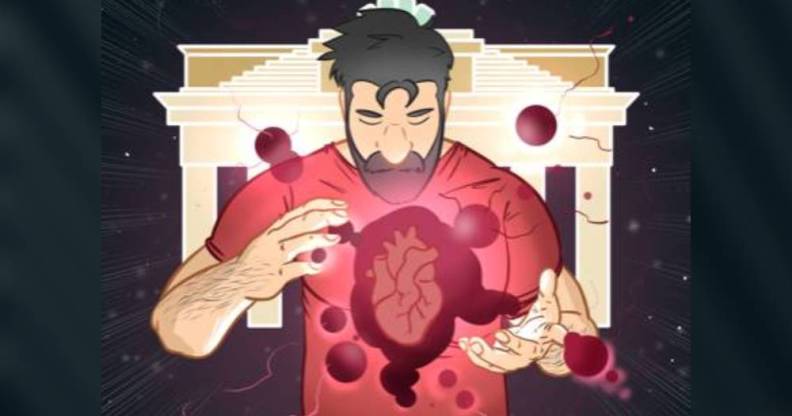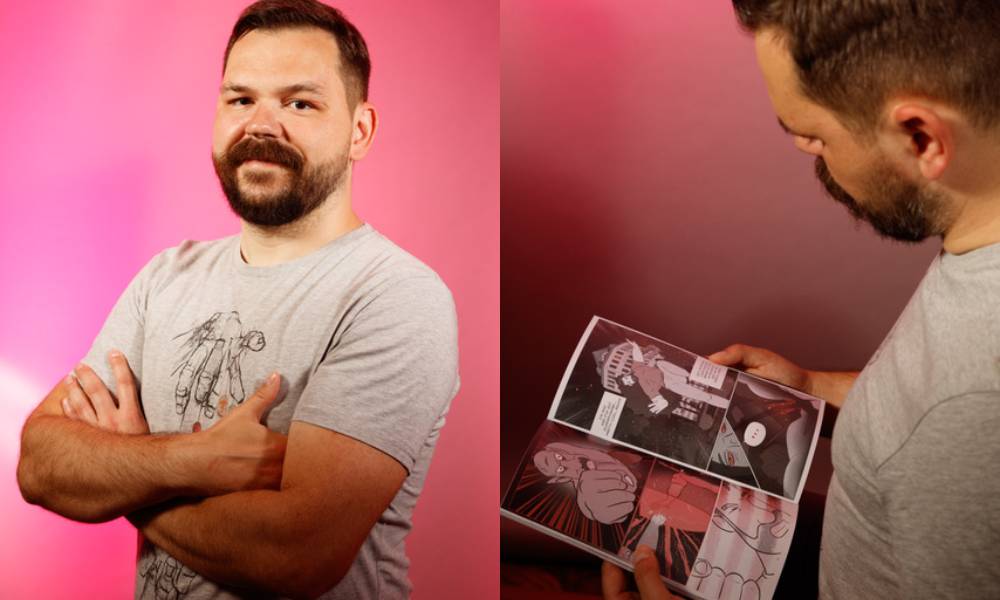Brilliantly queer comic book Power Bear tackles gay shame, mental health and alien apocalypse

In a world of buff, statuesque heroes, Power Bear is bringing body positivity and discussions of mental health to the queer community.
Imagine a superhero. They may be tall and muscular, like Henry Cavill’s Superman, or have the shoulder-to-waist ratio of Chris Evan’s Captain America. Maybe they even have his beloved “America’s ass”.
But a new breed of hero is slowly emerging in pop culture which is more representative of the beauty and variety of body shapes in the real world.
“Bears are hard to find in the comic mainstream,” Łukasz Majcher, creator of Power Bear, tells PinkNews.
“The only character that I could put in that category is Hercules from Marvel, but I guess that when he appears on the movie screen sooner or later, a young actor with an athletic body will be hired for his role.”
Majcher, a comic book creator from Berlin, embarked on a mission to create a protagonist who spoke to those feeling unrepresented in the superhero world, especially those within the LGBT+ community.
The result is Power Bear, which follows the story of a seemingly-unassuming office clerk.

Łukasz Majcher, author of Power Bear. (Provided)
Max feels trapped in a a “never ending cycle of meaninglessness” as he struggles to balance his relationship, work and a sudden decline in a family member’s health. During a shower scene, Max remembers how he was “full of energy” and would go about chores singing Kate Bush’s “Babooshka” at the top of his longs.
“Nowadays, I hardly have enough strength to squeeze toothpaste out of the tube,” he says.
All the while, a group of aliens are judging the worthiness of Earth’s continued existence. While several believe humanity is doomed, one alien thinks there is still hope for the planet, and it rests in Max’s hands to save the world. Queer superhero shenanigans ensue as Max becomes the one and only Power Bear.
Majcher describes the prevalent depiction of the LGBT+ community in pop culture as “a colourful rainbow and unicorns”.
Though that can be true, there is a flip side: people who are complex, grappling with mental ill-health, self-esteem issues and body confidence, among other things.
“I am happy with the positive reception of our community in mass culture, but on the other hand, the mental health problem faced by sexual minorities is very often forgotten,” Majcher explains.
“I often see muscled and hairy guys on Instagram who are very eager to post their selfies. I’ve met a few of them personally and very often they’re people who struggle with their complexes and don’t feel as sexy as they are perceived to be.”
View this post on Instagram
Majcher wanted to create Power Bear for a long time, but he felt defeated and doubted his creative abilities, struggling to see projects to completion.
Despite constant encouragement from his mother, it was only when he met his boyfriend Stefan that he truly found his inspiration.
“[Stefan] felt flattered and at the same time also recognised as a fully valuable person who suffers from a disease [depression] that usually no one talks about,” Majcher says.
“Depression lets people feel weak and insufficient and like a failure, a loser. But what if such a person suddenly gained superpowers?”
Majcher spoke with several people from the wider LGBT+ community who live with mental ill-health while creating Power Bear and was “shocked” at how many could relate to his partner and his struggles.
“I wanted our experiences to provoke discussion and be heard,” he explains. “Many times I have heard the opinions of my readers that I hit the nail on the head.”
Majcher adds: “It made me even more convinced that I had chosen the right direction.”
It’d be easy to assume that a gay comic called Power Bear would lean into sex. Majcher said that bear comics are “popular in the underground” partly for this reason, especially on the internet with fanfic is rife.
There is also a community that enjoys “erotic bara manga” – a genre of Japanese manga that features men with varying degrees of body fat, muscle and body hair.
But Power Bear forgoes “erotic” scenes to focus on its central theme.
“I would like it to be a comic for everyone,” Majcher adds. “Max, the main character of Power Bear, struggles with his own traumas and depression. Each of us can identify with this problem, regardless of sexual orientation.”

